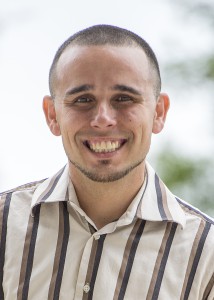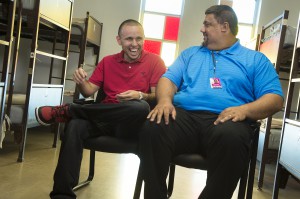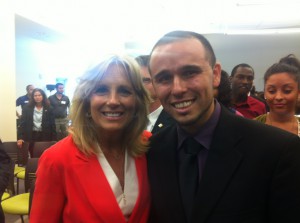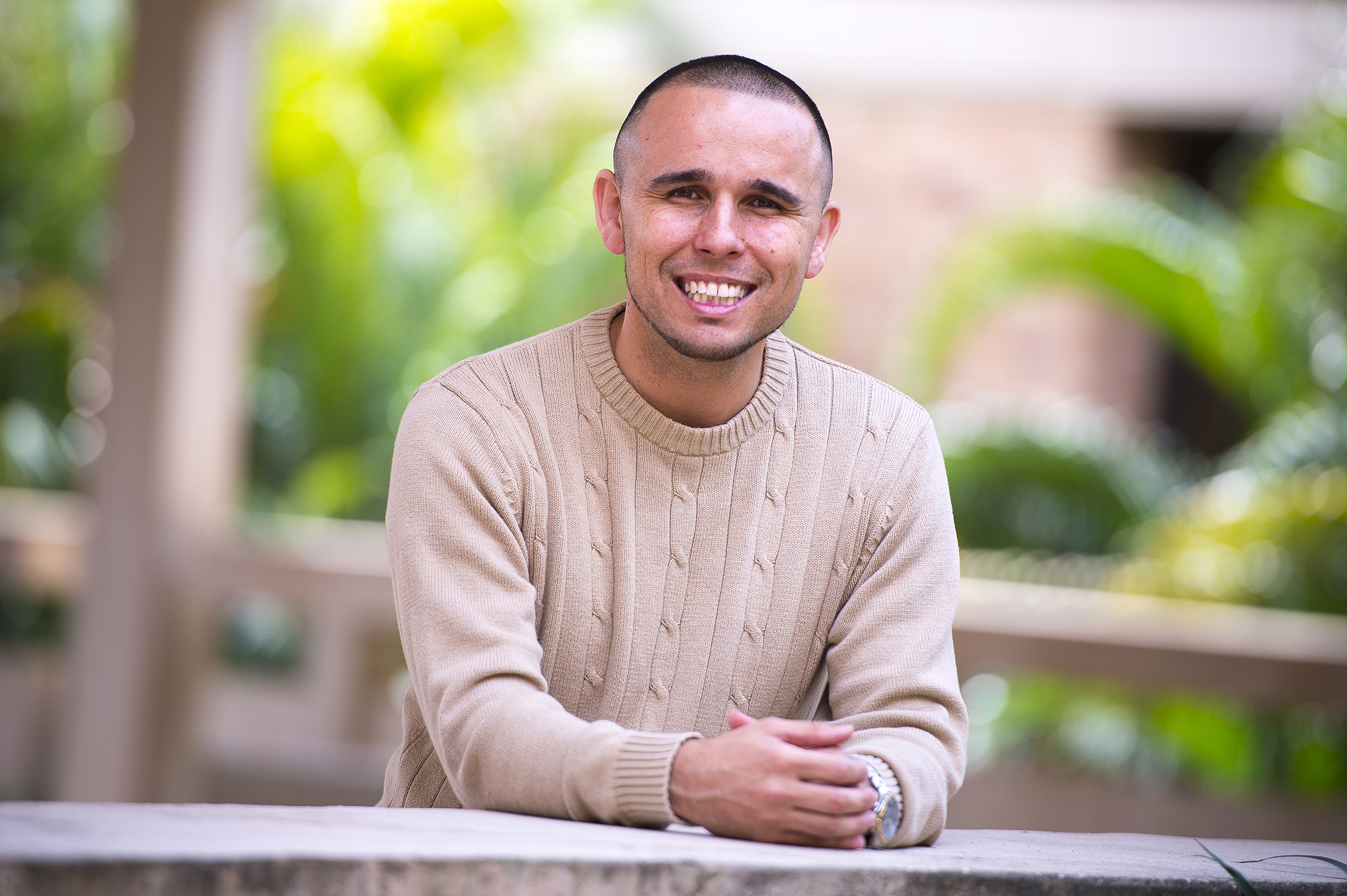When Angel Sanchez was released from prison at age 28 — after serving 12 years behind bars – he faced life and death choices.
He could return to Miami, where he’d been a teenaged gangbanger, and risk falling back into the same cycle of violence that landed him in prison. Although he knew Miami could be dangerous territory for him, he was still tempted to move back. Miami was the only home he’d ever known – and his family and friends would welcome him back.
“When you’re in prison, your dream is to go home,” he says. “It’s like ‘Cheers’ – it’s where everybody knows your name.”
Still, he had come up with another plan: Move to Orlando, where he knew no one, and go to college. It was a risky plan and a lonely one, too. When he arrived in Orlando, he had nowhere to go but a homeless shelter.
“I thought: ‘I’m going to lose my identity. I’m going to become a nobody and start fresh,’ ” he recalls.
But that was the path that Angel Sanchez chose.
On Saturday, May 3, Angel Sanchez will graduate from Valencia College and will deliver a speech at commencement as Valencia’s Distinguished Graduate from the class of 2014. He is earning his Associate of Arts degree and an Associate of Science degree in paralegal studies. Angel has a 4.0 grade point average and has been awarded a $30,000 a year scholarship from the Jack Kent Cooke Foundation to continue his undergraduate studies.
How a gang-banging teenager ended up as an honors student in college is the tale of an incredible journey that starts in prison.
 Angel, who’s now 31, began dreaming about college in prison. There, he’d taken the GED and earned a high-school diploma. His father had always preached the value of an education, so Angel took correspondence courses while he was behind bars. Eventually, he earned a paralegal certificate – and landed a job as a clerk in the prison law library. And there, Angel was inspired to go to college.
Angel, who’s now 31, began dreaming about college in prison. There, he’d taken the GED and earned a high-school diploma. His father had always preached the value of an education, so Angel took correspondence courses while he was behind bars. Eventually, he earned a paralegal certificate – and landed a job as a clerk in the prison law library. And there, Angel was inspired to go to college.
In prison, Angel listened to National Public Radio most of the day. And because the only newspaper available was USA Today, he read it faithfully. One day, Angel came across a two-page spread on the USA All-Academic Community College Team. “They were all second-chance people, people who’ve crashed and come back,” says Angel. “I decided right there, that I was going to find a community college and I’m going to go and make this USA All-Academic Team.”
Angel began writing to many of the state’s two-year colleges, asking if they’d let him enroll after he was released. Several returned form letters or catalogs. But Lisa Larson, who was working in Valencia’s admissions department at the time, saw Angel’s letter, asking for information. It was a plea for help. So she packed up a student course catalog and attached a Post-It note with a simple sentence: “Come see us when you get out.”
Angel latched onto that note. It was the hope he needed.
“I would have been happy if they’d sent a student handbook,” says Angel. “But they sent a note!”
And it led Angel to move to Orlando with nothing but a dream. Here, he found housing at the Salvation Army men’s shelter. Although the 12-month program is designed to help men land a job, shelter assistant director Kent DeGuzman took a chance on Angel Sanchez: recently released prison inmate, with no work history, whose real ambition was to go to college.
A homeless man finds a home
DeGuzman, who worked in the corrections field for six years, knows how easy it is for offenders to land back in prison. But he quickly discovered that Angel Sanchez wasn’t average.

Although Angel was upbeat and hard-working, he got frustrated by the number of times he got turned down for a job – and he had to land a job to stay at the Salvation Army. Just as he was ready to give up, Angel was offered a part-time job – flipping burgers at a hamburger stand on Orange Blossom Trail.
The job provided some comfort, but it also robbed Angel of one thing: an excuse for giving up and heading back to Miami.
“Going back to Miami was something that I wrestled with,” he says. “I remember crying myself to sleep some nights. I wanted to be celebrated, wanting to be hugged… I had all these emotional needs. And there was a world in Miami – a bad world – that was ready to hug me.
“But I knew that Miami was a step away from a prison cell.”
Landing that job saved him.
Determined to remake a life that many would have deemed hopeless, Sanchez rode the bus to Valencia’s West Campus. His tuition would be free, thanks to a state law that provides free tuition to homeless students, but Dr. Sylvester Robinson, who advises underprivileged students, knew that Angel would have other expenses, so he suggested that he fill out financial aid paperwork.
Rejected by the financial aid department, Angel learned that he’d been turned down because he’d never signed up for the U.S. Selective Service, which is required of men when they turn 18.
But the former prison law library clerk wasn’t ready to give up. He looked up the financial aid regulations – and, there in the fine print, lay the answer. Because he was in prison when he turned 18, he was exempt from the rule to register with the Selective Service. He highlighted the passage and submitted the regulation and rules along with his financial aid paperwork.
His application landed on the desk of Kenya Richardson, financial-aid coordinator at West Campus, who raised an eyebrow at the highlighted section of the regulations. She quickly called Robinson to ask if he’d looked up the regulations for Angel. “No,” Robinson replied, “the student did that.”
Richardson was floored. “I’ve got to meet this student,” she said. “No student does that.”
Richardson was so impressed that she hired Angel to be in the work-study program. Any student who would go to that trouble, she reasoned, would be able to maneuver through the morass of fine print in most financial aid documents.
Before long, Angel – with straight As – was making the President’s List, and was invited to join Valencia’s Seneff Honors College and become a member of the honor society. Over the course of the next year, he developed a large contingent of supporters, friends and faculty members.
“I like to say that by becoming homeless, I found a home,” says Angel.
Paying it forward
That would have been enough for many. But it wasn’t enough for Angel.
He mentored youngsters at the Coalition for the Homeless shelter and invited other honors students to join him. On late nights when he left campus, he stayed at the downtown bus station with another student while she waited for her transfer to another bus. And when the wife of Vice President Joe Biden visited Valencia College last year, Angel stood up – and challenged all the nation’s colleges to help homeless students like himself.

“I have met many people who were just as bright as me, who worked as hard as me, but who didn’t succeed because they didn’t meet the right people,” says Angel. “I look back and see individuals inside institutions – Valencia, the Salvation Army – who vouched for me. They tried to change a cookie-cutter system to make it a system that looks at people, case-by-case.”
Those people – from the manager who hired him to work at the burger joint, to Kent DeGuzman, to Lisa Larson and Kenya Richardson at Valencia College – are all Angel’s angels.
Still, Angel has faced obstacles. When he chose to enroll in the honors college’s leadership track, he had to ride a bus two hours each way to go to the Osceola Campus where the leadership track was based. But Angel plugged away, riding the bus until he could save enough money for a used car.
And when Phi Theta Kappa – the national honor society for students at the nation’s two-year colleges — told him he could not be a member because he is still serving probation, Angel turned in his PTK regalia sadly, but without rancor. Instead, he turned his attention toward changing the rules. Other PTK students around the country have taken up his cause.
“Some people call me ‘resilient,’ “ says Angel. “I don’t know if I am. But I have a characteristic: If I have a problem, I get stressed out for five minutes, get mad for five minutes, and then spend the rest of my time trying to work it out.”
Yet those challenges have inspired him to think bigger. When he met another student with a felony record – a young woman who graduated from University of California at Berkeley and is now attending Northwestern University’s law school – Angel was inspired to look beyond earning a degree in paralegal studies. Now he has set his sights on law school or graduate school.
And in April, he learned that he has won one of the most prestigious scholarships in the country: the Jack Kent Cooke Transfer Scholarship – which awards up to $90,000 over three years to approximately 85 students annually. Now, many doors are now open to Angel. Although he loves Orlando and is applying to UCF’s Burnett Honors College, he is also applying to Yale’s Eli Whitney Program, the University of Chicago and Columbia University.
And after earning his undergraduate degree, he plans to head to law school.
It’s hard to imagine anyone stopping him.
Check out this moving video of Angel telling his story.
Angel Sanchez: In His Own Words

Comments are closed.